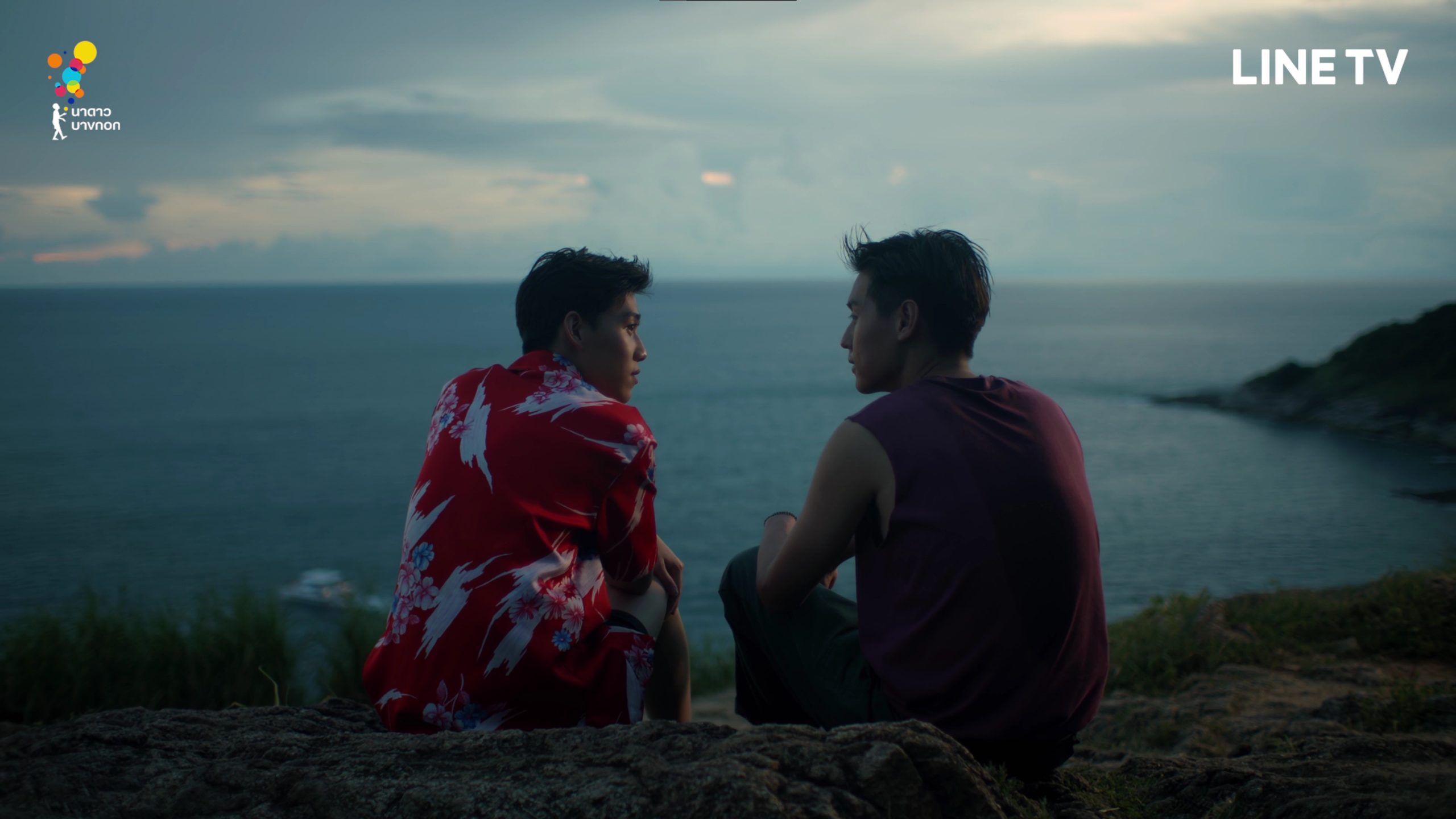In a scene from episode 4 of I Told Sunset About You, Oh-aew stands in front of a full-length mirror, staring wistfully at his reflection, his body contorted ever so slightly as if mimicking the curves of a woman. He has on a loose pair of red shorts that matches in hue with the brassiere he’s wearing—he found that moments ago in his mother’s wardrobe. Correcting his posture, Oh-aew crosses his arms and drapes them delicately across his alabaster torso, reaches out for his phone, takes a photo, and posts it on Instagram.
Suddenly, his face scrunches as the enormity of his actions dawns. Oh-aew quickly deletes the post and stares blankly at himself in the mirror before ripping the offending piece of clothing off.
ADVERTISEMENT
He throws the bra violently at the mirror and falls to the ground into a heap, sobbing uncontrollably, his cries echoing emptily in the warmly lit room. This is the apex of his emotional downfall, as Oh-aew questions all of his inadequacies: Why can’t he love me? Why am I not a girl? How do I stop loving him?
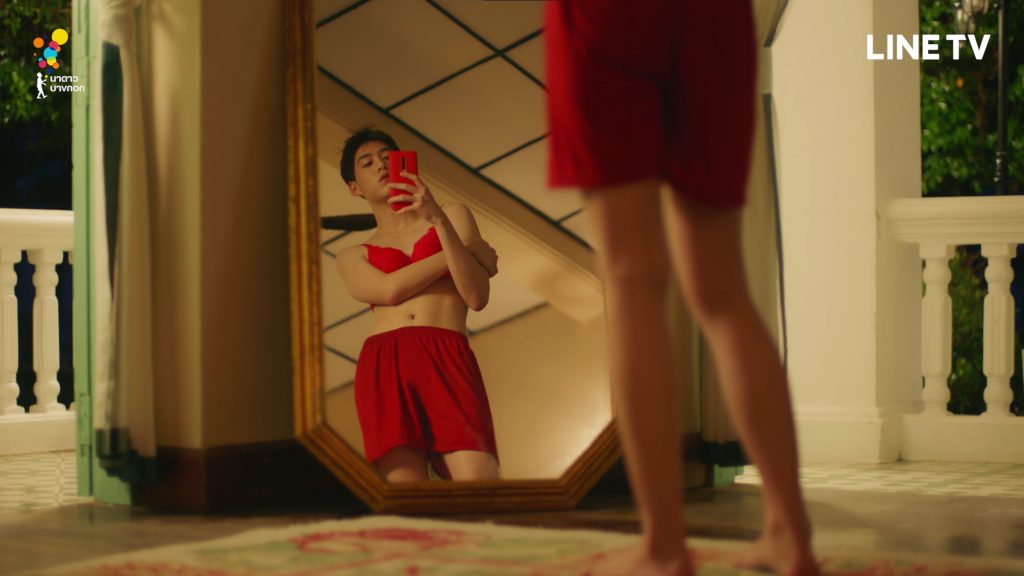
In this stirring scene from Nadao Bangkok’s Boy Love (BL) series, I Told Sunset About You, Krit “PP” Amnuaydechkorn plays the role of Oh-aew alongside best-friend-turn-foe-turn-lover, Teh, played by Putthipong “Billkin” Assaratanakul—both rising stars in the Nadao Bangkok talent universe.
The five-episode series comes hot on the heels of a renaissance in the BL genre, aptly renewed with everyone forced to stay home with nothing much else to do than to catch shows that allow us brief respite from the despotic realities of a worldwide pandemic. Unlike other BL series, however, I Told Sunset About You departs sharply from tired cliches of unrealistic and pained portrayals of adolescent love with a script that is sharp, sensible, and easy to follow. Still, in its retelling, it reveals deeper meaning hidden between the lines.
As kids, Teh and Oh-aew were the best of friends with a passion and penchant for acting—Teh, more so than Oh-aew. Tension arose when Oh-aew was chosen to helm the lead role in a school play—a role which Teh felt he was more deserving. As a best friend, though, Teh’s support for Oh-aew’s on-stage debut was unwavering, that is until Oh-aew, at the back of a successful production, proclaimed that he too might be considering a future as an actor, much to Teh’s disgust. Teh cruelly dismisses Oh-aew’s ambitions as cursory, and, in a Shakespearean twist and amidst the rising crescendo of strings, declares Oh-aew his rival.
There’s no space for two similar aspirations in a friendship—something has to give.
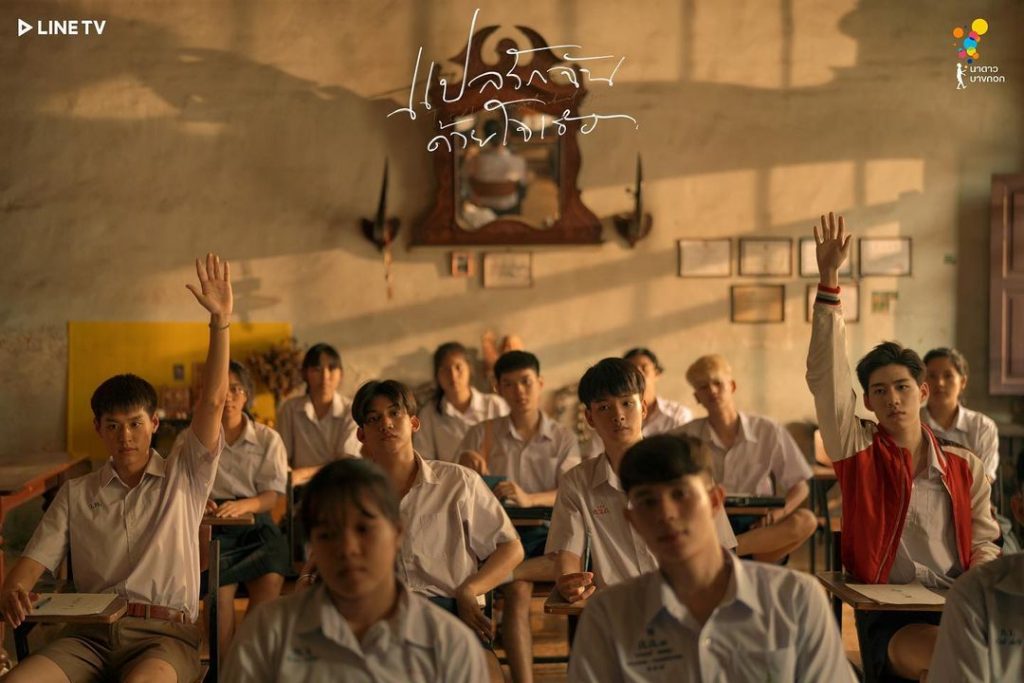
Now, as students in their last year of high school, Teh and Oh-aew reunite at a Chinese language tutorial centre in the lead up to their final exams before university admissions. Even with years in between, their childhood rivalry is no sooner forgotten by the competitive Teh, who excels in Chinese, and Oh-aew, whose abysmal grasp of the language threatens to upend his dreams of pursuing acting in university.
ADVERTISEMENT
After finding out that he managed to secure a place in his dream undergraduate course via a through-train track, Teh decides to end the rivalry and appoints himself Oh-aew’s personal Chinese language tutor so that Oh-aew too can secure a place in the same school as him. The stage, thus, is set for the story of the two star-crossed lovers, both alike in dignity, furtively unpacking layers of emotional hesitance largely shaped by expectations of a society that demands a normative view of love.
Written by ‘Goy’ Arachaporn Pokinpakor and ‘Kate’ Karakade Norasethaporn, the storytelling has vulnerability on the outset, helped along by a cast of young talents with precious lived-in coming-of-age experiences. At times, it feels like the whole series is enveloped in a deliberate sotto voce (at least when the actors aren’t vocally heaving with the floodgate of tears running down their face), eschewing traditional elements of expositions. It lets the audience infer and draw their own conclusions, leaving us to connect the dots however we wish without giving all the answers away.
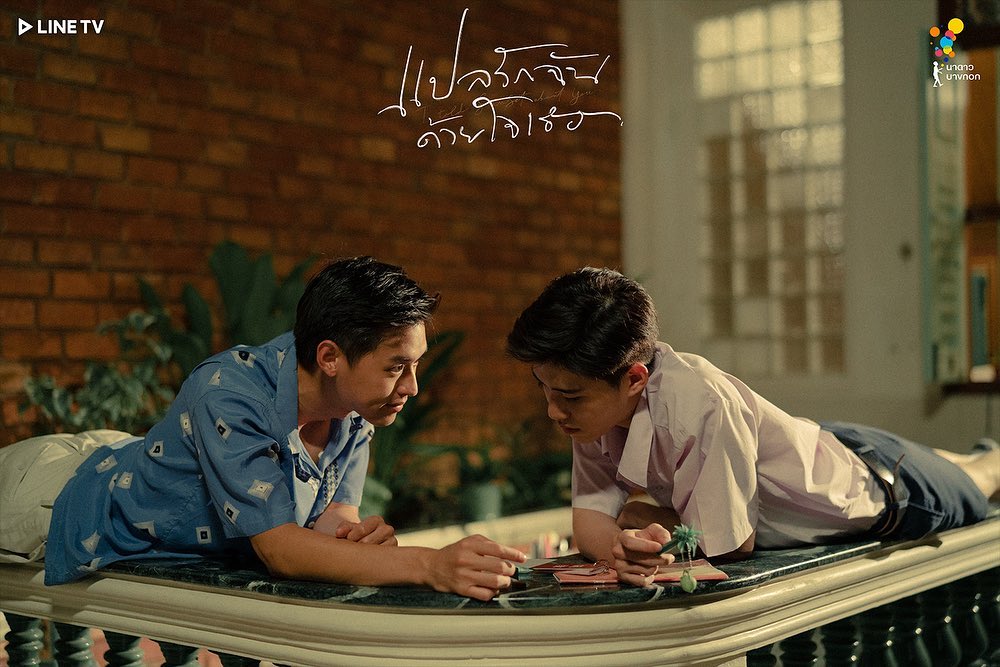
A scene at Teh’s two-storey shophouse drives home this point. Here, Oh-aew is tested on his ability to read Chinese words using red pocket flashcards that Teh used as a study aid. To simplify learning, Teh explained that all words containing the character ‘Xin’ (meaning heart in Chinese) would be associated with matters of the heart—Fang Xin to trust, Dan Xin, to be worried, Guan Xin means to care, Xing Xin is to have faith, Shang Xin is to be scared—words that would eventually serve as a premonition of the journey this relationship will take.
There’s no mistaking Director ‘Boss’ Naruebet Kuno’s role in beautifully setting the stage for this love story laced with furtive dalliances of intimacy—a head on a shoulder, fingers that brush briefly, knees that touch, a longing gaze. Film academics would observe Boss’ expert use of colour theory to frame each character’s intention—red as symbolic of an outburst of emotion, blue to represent passivity and intense feelings of loneliness.
It renders every scene bursting with metaphors, that is if you look hard enough. Metaphors like the use of red Hibiscus flowers and its symbolism of ephemeral beauty.
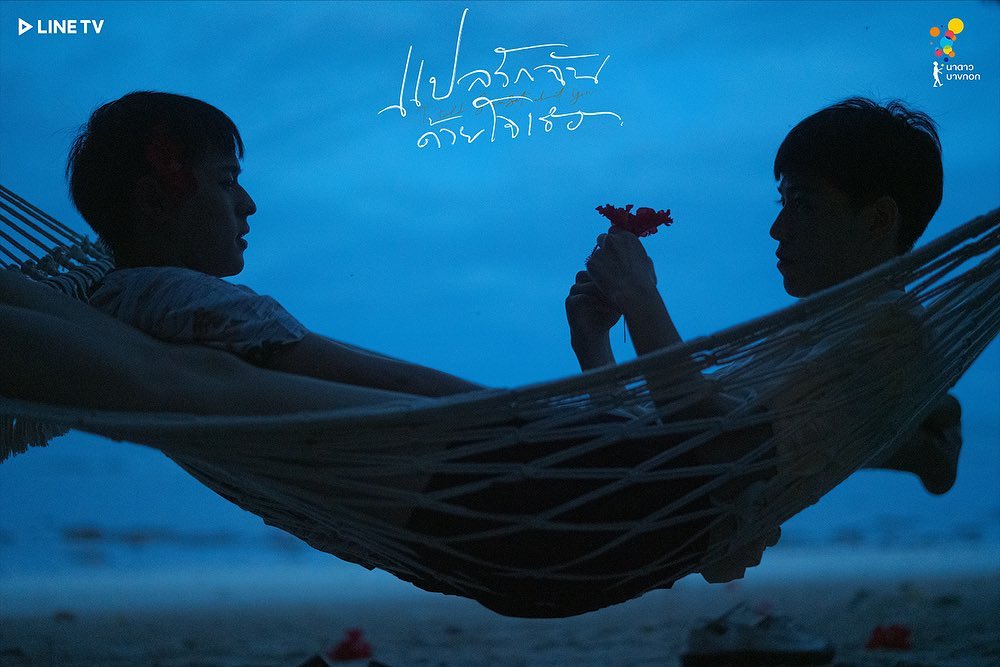
In the confession scene at the beach where Teh and Oh-aew reveal their true feelings for each other, the flowers represent passion and foreshadow Teh’s transient love for Oh-aew. Transience that will eventually form the backbone of the show’s greatest conflict. Or how Teh’s childhood aversion towards the scent of coconut changed when he smelt it on Oh-aew’s hair, as if to emblematise the acceptance of the feelings he has for Oh-aew, though still only obliquely.
ADVERTISEMENT
“Don’t give my time to others,” Teh pleads.
“You too. Don’t give mine to others,” Oh-aew replies both in assurance and as a request.
At its core, I Told Sunset About You excels best at portraying adolescent love at a level of realism that puts other BL series to shame. In its absolute refusal to worship at the altar of predictability (boy meets boy, boy is oblivious to these displays of affection, girl enters as villain, boy and boy realise their love is too deep to ignore), I Told Sunset About You pulls excessively at our heartstrings by consistently putting Teh’s indecisive feelings at the forefront while portraying Oh-aew as more decisive and at absolute ease of his love for Teh.
Oh-aew’s certainty is a poetic balance to Teh’s restless teenage angst, not unlike a time in school where we grew up with no role models to exemplify acceptance of same-sex attraction.
Still, at times when Teh matches Oh-aew’s affection in kind, the scenes are electric, compelling, and enigmatic, though never veering to outright eros. Rather, it’s adolescent eroticism marked by awkward posturing that shows a severe lack of experience in aspects of sexual physicality. Teenagers coming into adulthood would find such scenes familiar.
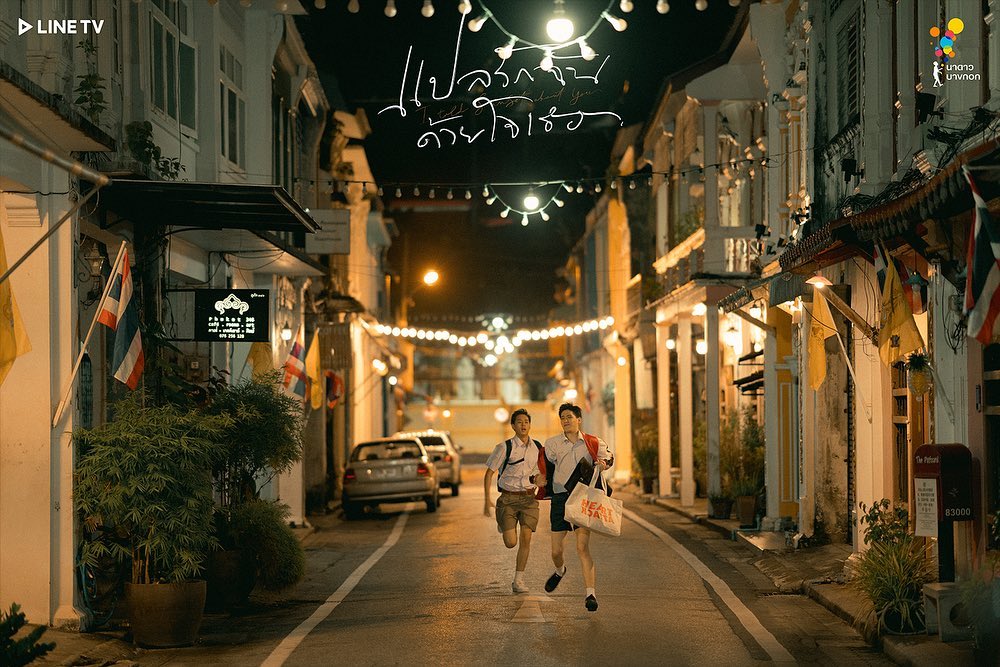
While I Told Sunset About You is a love story between Teh and Oh-aew, it is also, in many wonderful ways, a paean to Phuket Old town with its urban charm, buzzy nightlife, and white-sand beaches that seem to go on for miles and miles. These places were used to significant effect, framing an experience or a feeling so acutely, at the same time creating expansive and cinematic scenes tinged with warm hues that lend a certain romanticism to the cityscape.
Nowhere is this more succinctly exemplified than in episode 3, where Teh and Oh-aew run to Promthem Cape at the behest of Oh-aew and find a seat on the rocky outcrops. Here, set against the striking background of a Phuket’s setting sun, Oh-aew sings a Chinese love song to Teh, who translates it to Thai, line by line, a poetic declaration of his feelings expressed through song.
“Even separated by time, my heart still looks for you,” Teh assures Oh-aew as all around, day slips into night, the sun dipping gradually into the horizon.
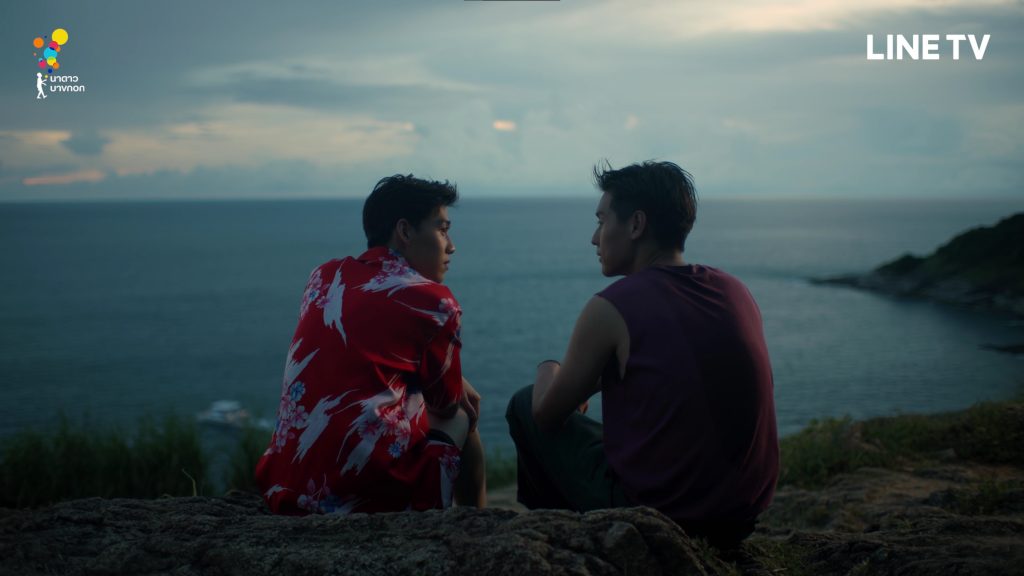
Lulled into a false sense of assurance that Teh’s and Oh-aew’s love is mutual, the story takes a quick and dramatic turn as Teh succumbs to the pressures of a world that he’s sure frowns upon such a union. He lets these expectations get the best of him and rejects Oh-aew’s affection, asking, “Aren’t things good the way it is now? Us, as friends?”.
Like dominoes set in motion, things then spiral out of control as Oh-aew begrudgingly learns to be at peace with Teh’s rejection. At the same time, Teh wrestles with piecing back the various relationships he’s sacrificed in deciding to reject his true self.
I Told Sunset About You might, at the onset, paint itself as just a BL series. But to regard it as merely that would be fallacious because ITSAY goes beyond the formulaic successes of a well-received BL. It’s a story of intimacy framed by fragile and formative experiences of sexuality and identity with scenes of intimacy that have been choreographed with care. This is not just a BL series, no. It’s LGBT Cinema with a visual lyricism that far exceeds what the world expects of it. Everything about I Told Sunset About You has been carefully crafted and deliberately deployed with finesse, and not a single stone left unturned—including a denouement that might make you believe in love all over again.
I Told Sunset About You
Director: ‘Boss’ Naruebet Kuno
Writer: ‘Goy’ Arachaporn Pokinpakor and ‘Kate’ Karakade Norasethaporn
Main cast: Krit “PP” Amnuaydechkorn, Putthipong “Billkin” Assaratanaku,
Running Time: 5 episodes of 1 hour each
Genres: Drama, Romance
Watch here.

